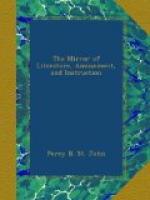The fair object of this last, and (with one signal exception) only real love of his whole life, was a young Romagnese lady, the daughter of Count Gamba, of Ravenna, and married, but a short time before Lord Byron first met with her, to an old and wealthy widower, of the same city, Count Guiccioli. Her husband had in early life been the friend of Alfieri, and had distinguished himself by his zeal in promoting the establishment of a National Theatre, in which the talents of Alfieri and his own wealth were to be combined. Notwithstanding his age, and a character, as it appears, by no means reputable, his great opulence rendered him an object of ambition among the mothers of Ravenna, who, according to the too frequent maternal practice, were seen vying with each other in attracting so rich a purchaser for their daughters, and the young Teresa Gamba, then only eighteen, and just emancipated from a convent, was the selected victim.
The first time Lord Byron had ever seen this lady was in the autumn of 1818, when she made her appearance, soon after her marriage, at the house of the Countess Albrizzi, in all the gaiety of bridal array, and the first delight of exchanging a convent for the world. At this time, however, no acquaintance ensued between them;—it was not till the spring of the present year that, at an evening party of Madame Benzoni’s, they were introduced to each other. The love that sprung out of this meeting was instantaneous and mutual,—though with the usual disproportion of sacrifice between the parties; such an event being, to the man, but one of the many scenes of life, while, with woman, it generally constitutes the whole drama. The young Italian found herself suddenly inspired with a passion, of which, till that moment, her mind could not have formed the least idea;—she had thought of love but as an amusement, and now became its slave. If at the outset, too, less slow to be won than an Englishwoman, no sooner did she begin to understand the full despotism of the passion than her heart shrunk from it as something terrible, and she would have escaped, but that the chain was already around her.
No words, however, can describe so simply and feelingly as her own, the strong impression which their first meeting left upon her mind:—
“I became acquainted,” says Madame Guiccioli, “with Lord Byron in the April of 1819:—he was introduced to me at Venice, by the Countess Benzoni, at one of that lady’s parties. This introduction, which had so much influence over the lives of us both, took place contrary to our wishes, and had been permitted by us only from courtesy. For myself, more fatigued than usual that evening on account of the late hours they keep at Venice, I went with great repugnance to this party, and purely in obedience to Count Guiccioli. Lord Byron, too, who was averse to forming new acquaintances,—alleging that he had entirely renounced all attachments, and was unwilling any more to expose himself to their consequences,—on being requested by the Countess Benzoni to allow himself to be presented to me, refused, and, at last, only assented from a desire to oblige her.




